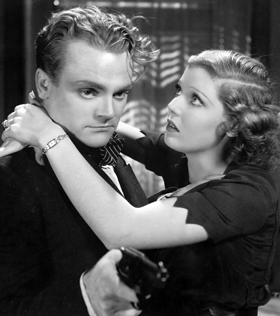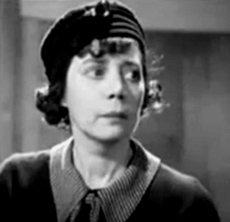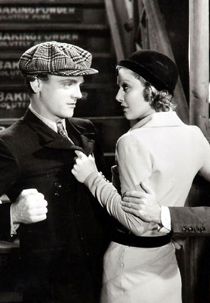
 |
|
|
|
In the half-dozen movies Warners rushed out to exploit its new, dynamic star James Cagney, 1932's Taxi is a mother lode of famous movie lore. It's here that Cagney's famous misquoted line, "You dirty rat!" comes from. And here's where we get to see a grinning Cagney dish out several dialogue lines of fluent Yiddish, when conversing with a Taxi passenger. Kubec Glasmon and John Bright, the writer's of Mr. Cagney's breakthrough The Public Enemy, spun out several more scripts for the actor in the space of a few months. Taxi is a snug fit for Cagney's personality. His character Matt Nolan is a streetwise workingman with a mean temper, but has a big heart. Although he's not a criminal per se, Matt doesn't trust the cops and prefers to settle his own scores. He fancies himself a ladies' man but needs the right girl as a civilizing influence. 
The civilizing influence in this case is Loretta Young, one of the most beautiful women in Hollywood at only nineteen years of age. Taxi may not exactly fit in the rank of James Cagney's best movies, but it's a fun discovery to make while digging further into his career. A New York taxi war sees petty thug Buck Gerard (David Landau of Gabriel Over the White House) working for the big company Consolidated Taxi, using intimidation to put independent drivers out of business. When veteran lone wolf driver old Pop Riley (Guy Kibbee) dies in jail after fighting back against Buck, his daughter Sue (Loretta Young) falls in love with the feisty Matt Nolan (Cagney), another independent who doesn't let the Consolidated thugs push him around. Matt and his brother Danny (Ray Cooke) make it to the end of the taxi war, and Matt curbs his belligerent manners long enough to convince Sue to marry him. But when Matt finds out that Buck was responsible for Pop's death, he can't resist getting into trouble again. He puts himself and his brother at risk, and Sue has no intention of living under such conditions. Taxi shows the Warners production team expertly conjuring up New York on their elaborate back lot sets. Only the blazing California sun gives away the illusion of crowded Manhattan side streets. As always the strong and organized prey upon the weak and poor, and the screenplay shows Matt forming an ad hoc independent taxi driver's union to fight off the syndicate. But rather than become a social statement, Taxi instead concentrates on the difficulties of the Matt-Sue marriage. The volatile Matt raises his fists over minor annoyances, which seem to be a constant on the crowded sidewalks and elevators; Sue is soon tired of Matt ruining evenings by starting fights or embarrassing her in public. 
Among the scenes played for laughs is another instance of prime Hollywood lore. Sue and Matt compete and lose a dance contest, and Matt's opposite number is none other than George Raft, unbilled. Most of Raft's parts until now had seen him dancing but his stock was surely rising. Just a couple of months later he'd hit big opposite Paul Muni in Howard Hawks' Scarface. Taxi's only nod to pre-Code naughtiness occurs when we Ms. Young is shown dressing or undressing for purely voyeuristic reasons. She ends up in a fairly sheer and revealing slip. It's fun to see Loretta playing this pre-Code peek-a-boo game, knowing that just a few years later she'd erect a public facade of forbidding Christian & political conservatism. Pulling major support are Matt's fellow taxi driver Skeets (George E. Stone, "Toothpick Charlie" years later in Some Like It Hot) and Sue's waitress friend Ruby (Leila Bennett). Bennett's grating accent and slightly dimwitted screen persona provided comedy relief in a number of good pre-Code movies; my favorite is Doctor X. Her Ruby maintains a delusion of great attractiveness in all situations. We get to see Cagney dance, behave like a Cock o' the Walk with Loretta Young, punch out a few people and bash a taxi cab about when harassed by the thugs. The actor does really well in the Taxi considering that he had to learn to drive for the role -- in New York City the actor learned a lot of things but had never before needed to get behind a wheel. The show goes into its last act when Sue fears that her husband's quest for vengeance will land him a long prison sentence, just like the one that killed her father. Buck Gerard's moll Marie (Dorothy Burgess) asks Sue for money to help Buck escape, with the idea that Sue will do anything to keep Buck far away from Matt's hair-trigger temper. Of course, Matt finds out anyway, grabs his gun, and can't be stopped. 
James Cagney seems to have a lifetime of energy and vitality at his disposal, and his screen persona projects charm aplenty. More than any other actor, Cagney personifies the enterprising, fighting spirit that would hopefully pull the country out of the Depression. Loretta Young is no mere Love Interest but an engaged partner. One scene of them necking in a movie theater is just as natural as anything done by actors following a later style or method. Not even seventy minutes in duration, Taxi is a very pleasing pre-Code delight. The Warner Archive Collection DVD-R of Taxi is a good transfer of film elements in good shape. Some scratching is present and the soundtrack may be a good dupe, as neither is as pristine as other Warner titles from this period. All the dialogue, much of it funny, comes through clearly. I'm not sure that the film has a normal music score -- all we hear behind the titles is traffic noise. 
Warners' camera ventures off the back lot for a couple of street scenes that look nothing like New York, as the skyline is almost clear of tall buildings. One early angle of Cagney's cab was taken on Los Angeles' Beverly Boulevard, just West of La Brea and looking East. The building that eventually became The New Beverly Theater is on the left, while looming in the background is a lone four-story luxury apartment. It happens to be the same building used in The Best Years of Our Lives as Fredric March's residence, as I documented in my footnote #3 to my Best Years review.
On a scale of Excellent, Good, Fair, and Poor,
Taxi rates:
Reviews on the Savant main site have additional credits information and are often updated and annotated with reader input and graphics. T'was Ever Thus.
Review Staff | About DVD Talk | Newsletter Subscribe | Join DVD Talk Forum |
| ||||||||||||||||||